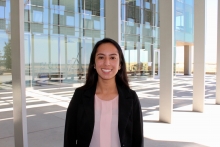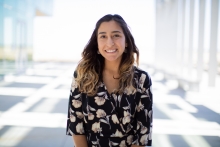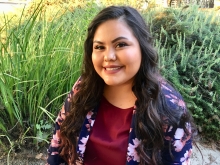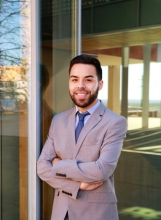Gino Acevedo
Gino Acevedo is from Visalia, CA, a small rural community located in California's Central Valley. He currently is in his fourth-year at UC Merced as a Human Biology Major where he has been involved in health psychology research since his second year. As a congressional intern for Representative Dr. Raul Ruiz, he was able to gain experience in health policy research which opened his eyes to the field of public policy in healthcare. On his vacation time he volunteers at a free clinic in his hometown where he works primarily with low-income and uninsured populations. Gino enjoys long-distance running and nature walks on his free time. He plans on attending medical school and returning to the valley to practice as a family physician while focusing on the health of day laborers.
Water, Jobs, and Politics: Farmworkers of Fresno County's Westlands Water District
Gino L. Acevedo1, Mario Sifuentez, PhD2; School of Natural Sciences, University of California, Merced1; School of Social Sciences, Humanities, and Arts, University of California, Merced2
California’s Central Valley contains some of the richest agricultural land in the entire world, producing a quarter of the nation’s food. The Westlands Water District (WWD), located in the southwest of the San Joaquin Valley, produces various crops on a plot of land roughly the size of Rhode Island. In this district, primarily composed of agricultural land, water deliveries affect what can be grown and when, influencing the labor force. Utilizing WWD archival records, census records, Bureau of Labor Statistics data, and congressional records, this study investigates the influences water deliveries and relevant legislation have on the growth of the farmworker population. Despite fluctuations in the farmworker population, no trend or relationship between population growth and water deliveries was found; however, these random fluctuations could indicate economic depressions, immigration policies, and agricultural legislation that affect this specific group aside from water deliveries. That is why it is important to continue to investigate what additional factors influence the growth of the farmworker population in agricultural regions similar to Fresno County.
Nonzenzele Aldonza
 |
Major: Management and Business Economics
Home City: Long Beach, CA
Contact: naldonza@ucmerced.edu
Faculty Mentor: Whitney Pirtle
|
Nonzenzele Aldonza is a third year undergraduate student majoring in Management and Business Economics. In the upcoming years she will graduate in the Spring of 2020 with plans of going straight into graduate school the following Fall. Once obtaining both her masters and Ph.D she wants to pursue a career as a Chancellor and continuing advocating for black students pursuing degrees in higher education. She works on campus as a Tour Guide and Student Ambassador, External Vice President for AFRO, Vice Chair of the Student Fees Committee and is studying for her real estate exam. In her free time she likes to hang out with her family and friends, give back to her home community and school community and bother her mother. When she relaxes she fantasizes about having a dog, indulging in reality television and spending unnecessary money on clothes. Her number one thing she wants to get out of life is being a role model for younger students and continue enjoying life.
Living Black in the Field of Brown
Nonzenzele I. Aldonza, and Whitney Pirtle, PhD; School of Social Sciences, Humanities, and Arts, University of California, Merced
A study measuring graduation rates shows that only 70 percent of black students at UC Merced graduate as compared to comparable public research institutions and other public universities. What could we attest to these findings? In 2014 we opened a living learning community built on pillars of mentorship, community outreach, and academic workshops. Additionally, we asked for contact information of the prospective black students to start formulating a relationship with them prior to them coming to campus. After the establishment of Afro Hall, it was discovered that black students retention rates increased, becoming the highest of any single demographic group on campus. That data illustrated a direct correlation between increased support, and performance. After conducting focus groups with black students about their black experience both in Afro and on campus, that information was used as the primary data. Secondly, interviewing the institutional supporters was vital information to provide a unique experience. In conclusion, the typical student who steps into AFRO are students seeking that community away from home but also a student who absorbs all the information that is given to them. This data will help us advocate for more black student spaces on campus.
Diana Alvarado
Diana Alvarado is an upcoming fourth year undergraduate student at the University of California, Merced. She is expected to graduate in the Spring 2019 with a degree in Cognitive Science and a Spanish minor. Diana has been an active member of the Michael Spivey Cognitive Science lab since her freshman year and is still holding strong as a Research Assistant. After returning from studying abroad in the National Autonomous University of Mexico, Diana made herself a mission to learn as much as she could about her heritage and roots. Some of her hobbies include visiting California’s National Parks and Brazilian Jiu-jitsu. She hopes to pursue a master’s degree in Speech and Language Pathology and practice her profession in the Central Valley to help the place she calls home.
Demographics of the Migrant Education Program
Diana Alvarado, and Robin DeLugan, PhD; School of Social Sciences, Humanities, and Arts, University of California, Merced
The purpose of this project is to highlight the achievements of the Migrant Education Program (MEP) with the migrant farmworker community in the Central Valley. Fresno MEP IV has one of the highest funded programs in the state of California and largest population of qualified students. As the migrating community is reshaped every year by the seasons and crops, the question remains how MEP establishes itself in the community in order to influence its targeted population, especially “special populations” such as the children of Mexican indigenous farmworkers, a linguistically and culturally diverse growing California population. How is this special population acknowledged in statistical and other program data? The methodology used to collect the data involved newspaper articles, published reports, along with archives that highlight the policies that helped establish the program and the role it has played for the state of California and Fresno area. Collective data of past and present students, requirements from the children of members of the community, and summer school specifically targeting migrant students from all over the state. Within the findings, results showed a gap in the demographical data of the program which it is yet unclear whether this has caused an impact in the area.
Natalia Alvarado
Natalia Alvarado is a fourth-year undergraduate student from Riverside, CA. Expecting to graduate Spring 2019 with a BA in English and minors in Spanish and Writing. Natalia has already begun to make her mark at the University of California, Merced by conducting reserach and having two poems published in the University's Undergraduate Literary Journal. During the academic year, Natalia is also a Resident Assistant who enjoys being a resource to others. After receiving her bachelor's degree, she hopes to attend graduate school and get her teaching credential in order to become a high school literature teacher, and eventually a professor.
The Production of New Corridos as a Response to the Current Immigration Crisis in the U.S.
Natalia Alvarado, and Patricia Vrgara, PhD; School of Social Sciences, Humanities, and Arts, University of California, Merced
Research on the collateral consequences of incarceration shows that over half of previous offenders in the U.S are rearrested within five years of their release from prison. This leads to the question of what obstacles exist for formerly incarcerated individuals post release and in what ways societal institutions are helping or hindering their process of reentry. This research project is based on 10 interviews with formerly incarcerated men about their experiences before, during, and post incarceration. The interviews explore how these men understand their own experiences in efforts to raise awareness on their needs and realities in our communities. The analyses reveal the challenges formerly incarcerated men face socially, economically, and emotionally as they reintegrate into society. Specifically, we find that many of the obstacles the formerly incarcerated men face stem from: the stigma they encounter throughout everyday life, barriers within societal institutions such as the parole system, and emotional trauma related to their experience within the prison industrial complex.
Olivia Alvarez
Olivia Alvarez is a third-year undergraduate student from Merced, CA who is expected to graduate early in the Fall of 2018 with a BA in Public Health, and a minor in Natural Science of Education (NSED). Olivia is a well-rounded individual who loves to do pretty much anything. She loves mentoring first years and has shown her commitment to her former job as a mentor at the Bright Success Center. She has a passion for helping others and loves to do community service with the Omega Leo Club and has started conducting research for the SURI Program. As a sophomore, she started a club called Generation to Generation (G2G) that helps organize a yearly conference every spring called the Splash Conference. This club has enabled and empowered students from different high schools to apply for college and pursue higher education. She loves to spend her time playing soccer with her friends, going on hikes in Yosemite, or going out to eat.
The Lingering Effects: Family Members of the Incarcerated
Olivia Alvarez, and Tanya Golash-Boza, PhD; School of Social Sciences, Humanities, and Arts, University of California, Merced
The process of assimilation often pressures young undocumented immigrants to forge new identities. This cultural transformation can cause them to feel as if they have fragmented identities which they must then negotiate to develop their own identities. This autoethnographic study explores how I have used music across my life to craft a narrative identity and how music has served as a conduit for binding my feelings and thoughts to my values. I first establish a definition of “identity” based on a review of literature, then analyze a select set of songs which represent my musical-narrative identity. This analysis will enable me to track the evolution and negotiation of my identity within the context of being a young undocumented immigrant in the United States of America. Finally, I discuss how certain types of music and songs have helped foster my hybrid identity despite the cultural shift experienced as a child and the ongoing cultural customs that render immigrants’ humanity as insignificant. The objective of this study is to further examine the relationship between music and identity under these specific political and cultural circumstances, its effects at the individual level, and how this researcher’s particular experience might reflect what other young undocumented immigrants go through to preserve or forge their identities.
Angelica Costilla-Mancha
Angelica Costilla is a student entering her third-year of undergraduate education at UC Merced, who was born and raised in Madera, California. Expected to graduate in the spring of 2020, Angelica is currently pursuing a double major in English and Sociology with a minor in Chicana/o studies. She has worked in UC Merced's Bright Success Center as an Orientation Leader and a USTU10 Peer Instructor, helping guide first year college students as they transition into higher education. She is also a volunteer with Communities for a New California, a non-profit organization that provides community outreach for residents of South Merced. Angelica is currently a UROC-H scholar engaged in research focused on the effects of mass incarceration under Dr. Tanya Golash-Boza. She is extremely thankful for the opportunities she has been afforded. Because of the struggles she’s witnessed in her own community in the fields of education and incarceration, she aims to utilize the tools she’s learned from higher education in order to advocate for change in how the U.S runs rehabilitation and education practices. Her ultimate goal is to become an educator who fights to make powerful efforts in ending the school to prison pipeline and aid in the justice that youth deserve.
Incarceration and Reentry: Unpacking Stigma and Rehabilitation
Angelica Costilla-Mancha, and Tanya Golash-Boza, PhD; School of Social Sciences, Humanities, and Arts, University of California, Merced
Research on the collateral consequences of incarceration shows that over half of previous offenders in the U.S are rearrested within five years of their release from prison. This leads to the question of what obstacles exist for formerly incarcerated individuals post release and in what ways societal institutions are helping or hindering their process of reentry. This research project is based on 10 interviews with formerly incarcerated men about their experiences before, during, and post incarceration. The interviews explore how these men understand their own experiences in efforts to raise awareness on their needs and realities in our communities. The analyses reveal the challenges formerly incarcerated men face socially, economically, and emotionally as they reintegrate into society. Specifically, we find that many of the obstacles the formerly incarcerated men face stem from: the stigma they encounter throughout everyday life, barriers within societal institutions such as the parole system, and emotional trauma related to their experience within the prison industrial complex.
Danya Dominguez De Anda
Danya was born in Guadalajara, Mexico, and grew up in Modesto, California. She is a fourth-year transfer student from Modesto Junior College where she obtained her Associate of Arts degree in Music. She now majors in Psychology at UC Merced and is expected to graduate in Spring 2019. She hopes to one day become a Behavioral Health Clinician or Music Therapist. Danya previously served as the Senator of Diversity for Student Government at her community college and also worked as a student mentor at the school’s Center for International and Undocumented Students. Now at UC Merced, she is the Lead Operations Fellow for the TRVProgram. She is also involved in research, and is the founding President of the Define American Chapter at UC Merced. In her free time, Danya enjoys reading, drawing, playing guitar, and exploring classical and world music.
How Music Informs the Identity of a Young Undocumented Immigrant
Danya Dominguez De Anda, and Jayson Beaster-Jones, PhD; School of Social Sciences, Humanities, and Arts, University of California, Merced
The 1902 Reclamation Act is one of the greatest land reform and agrarian U.S. federal statutes because it began the dramatic transformation of arid sections of the American West by providing federal help for irrigation projects. The irrigation supplied by this act intended to stimulate the economy, by decreasing unemployment specifically for farming families, and promoting healthier rural communities. This law attempted to achieve these goals by establishing the requisites of a 160-acre land limitation and residence requirement. However, owners of large landholdings found ways around these requirements, amassing most of the rich land in the west Fresno area, known as the Westlands Water District (WWD), leaving family farmers without any land to cultivate. By taking an in depth look through National Land for People archives which included newspaper articles, and congressional records, press releases, and maps, my findings reveal that approximately during the years of 1960-1986 political battles existed between the National Land for People and corporate landowners from the WWD. The conflict between the two was the result of the Reclamation Act being violated. In conclusion, this project closely examines the exploitation that private farm workers faced by agribusiness aficionados and sheds new light on the previously ignored efforts made by farm worker activists to enforce this Act.
Sandy Dorantes
 |
Major: Psychology
Home City: Wilmington, CA
Contact: sdorantes@ucmerced.edu
Faculty Mentor: Jayson Beaster-Jones
|
Sandy Dorantes is a second-year undergraduate student from Wilmington, CA. Expected to graduate in Spring 2020 with a BA in Psychology. Sandy has begun to make a mark at the University of California, Merced by conducting research and being an active volunteer in the community. As an officer of Rotaract and VITAS volunteer, Sandy finds it fulfilling to help out wherever she can and stay involved in organizations that matter to her. To destress, Sandy finds herself painting with watercolors and going to the movies. She aspires to achieve a doctorate in Occupational Therapy for the elderly, and her ultimate goal is to inspire her younger siblings to pursue higher education. Lastly, she hopes to one day open her own private practice.
Accessible Care for the Aging Population in Merced County Senior Facilities
Sandy Dorantes, and Jayson Beaster-Jones, PhD; School of Social Sciences, Humanities, and Arts, University of California, Merced
As the last wave of the baby boomer generation becomes eligible for entry into some senior facilities it is vital to examine the barriers seniors face in accessing these places. I examine how socioeconomic factors related to the type of healthcare coverage eligibility, the cost of attending the facility, and race affects access to the senior facilities. Using secondary sources, such as the U.S. Census, Merced County files, website information, and an in-depth literature review, I examine senior facility cost, healthcare coverage aid, and barriers seniors face when trying to access these facilities. These findings may continue to assist in our understanding of the limitations diverse racial groups with different healthcare coverage face when trying to find an affordable senior facility that meets their evolving needs. As the aging population continues to grow, outnumbering children by 2035 by an estimated 1.6 million (U.S Census 2017), it is critical for researchers to further investigate the barriers this age group continuously face.
Anahi Garcia
 |
Major: Management and Business Economics
Home City: Santa Paula, CA
Contact: agarcia389@ucmerced.edu
Faculty Mentor: Mario Sifuentez
|
Anahi Garcia is a third-year undergraduate student from a small agricultural town in Southern California known as Santa Paula, CA. She will be a part of the graduating class of Spring 2020 with a BA in Psychology and a minor in Management and Business Economics. Anahi has begun to make her mark at the University of California, Merced by being a part of the National Society of Leadership and Success pilot program, and by conducting research. In addition, she has been involved in community service events as part of Hermanas Unidas. She believes that it is important to give back to her community and be grateful for all that it gives to us. To destress, Anahi finds herself riding horses and going on outdoor adventures such as hikes. Her ultimate goal is to be a woman who can inspire future generations that come from underrepresented/minority backgrounds.
Land, Sustainability, Exploitation: National Land for People and agribusiness War Over the Reclamation Act of 1902
Anahi Garcia, and Mario Sifuentez, PhD; School of Social Sciences, Humanities, and Arts, University of California, Merced
How events and individuals are documented in the past influences our understanding of these entities in the present; this is especially true for minority groups. When it comes to Merced County, located in California's Central Valley, historical documentation of nineteenth-century Chinese immigrants is sparse; little is known about how the Chinese formed their own communities - which were pushed to the outskirts of the city of Merced. This research seeks to add more depth to the memory of the Chinese in Merced. In partnership with the Merced County Library, I conducted an analysis using newspaper articles from 1850 to 1900, with a focus on articles and advertisements concerning Chinese immigrants. After extensive research, I discovered little information concerning this minority group. The small pool of evidence that was found supported the stereotypical notion that people of color do not contribute to community formation. As a result, I contend that our understanding of the Chinese in Merced has been impacted negatively. Although the history of Merced's Chinese immigrants has been suppressed, preliminary research seeks to gain an insight on how Chinese residents formed communities and made a life for themselves. Ultimately, this project will add a deeper layer to notions of memory and community within minority groups in the Central Valley.
Omar Gonzalez
 |
Major: History and Critical Race & Ethnic Studies
Home City: Santa Ana, CA
Contact: ogonzalez24@ucmerced.edu
Faculty Mentor: Mario Sifuentez
|
Omar González is a rising Junior majoring in History and Critical Race & Ethnic Studies with a minor in Policial Science from Santa Ana, CA. Omar aims to graduate with the highest honors in Spring 2020. Omar began his first research project in January of 2018 under the supervision of Dr. Mario Sifuentez. The project details the effectiveness of labor organizations in preventing irrigation water from illegally benefiting excess landholders in the West Fresno area. In connection with this project, Omar will participate in the History Honors Program, allowing him to continue his research up until the Spring of 2019. He plans to present his work at the 2019 meeting of the Organization of American Historians in Philadelphia and write a 50-100 page thesis. Whenever he’s not working you can find him enjoying a Chivas or México soccer game.
The Fight for Family Farms: Farmworker Success in the Westlands, 1960-1986
Omar Gonzalez, and Mario Sifuentez, PhD; School of Social Sciences, Humanities, and Arts, University of California, Merced
By recording the dynamics of feedback systems, a researcher can gain insight into the neurological processes involved into the discipline of human embodied cognition through creating an analogical model of the human brain by creating a modular system that utilizes the use of feedback loops. Insights derived from a feedback loop model will allow any researcher to explore areas that reach across an array of multiple disciplines such as cognitive science, psychology and physiology. This is achieved by programming an analogical model by way of modular video and audio synthesis. How this is achieved is a sine wave oscillator is routed through a video signal LFO (low frequency oscillator), into an input and output terminal source simultaneously, thus creating a positive feedback loop. Positive feedback loops, along with other types of loops, allow researchers to collect discreet data associated with the emergent properties associated with feedback systems, and their dynamics. The study of dynamical systems in feedback loops is known as Cybernetics, which has been around since the 1950’s. Along with employing techniques used in assessing subjective phenomena and coding it as an objective occurrence, we are able to create a heuristic to understanding embodied cognition through modeling a neural network using feedback loops through cybernetics and phenomenological models.
Angelica Jaramillo
Angelica Jaramillo is a third-year undergraduate student from a small beach town known as Carpinteria. She is expected to graduate in Spring of 2020 with a BA in Psychology. Angelica has already begun to make her mark at the University of California, Merced by becoming a peer educator as part of the CARE office on campus. Angelica thinks gender equality is important in order for children to grow in an environment that does not limit them to their stereotypes. To destress, Angelica finds herself relaxing at the beach and listening to music. She aspires to pursue a Master's in Developmental Psychology, and her ultimate goal is to become an advocate for women’s rights who can inspire young women to achieve their passion.
Esther Jin
 |
Major: Psychology
Home City: Alameda, CA
Contact: ejin2@ucmerced.edu
Faculty Mentor: David Torres-Rouff
|
Esther Jin is an ongoing fourth-year undergraduate student from Alameda, CA. Majoring in Psychology and minoring in Sociology, she is expected to graduate in Spring 2019. She is exploring her options for possible future careers by experiencing research through SURI, and hopes to possibly continue research throughout the upcoming school year. She has been a part of the Bakery Club and served as an officer. Esther likes to volunteer and give back to the community. She also enjoys attending concerts and spending time with her family and friends. She is also interested in learning more about counseling. Her biggest goal is to continue contributing to the lives of others, whether it be through her possible career in research or counseling.
A Historical Analysis on the Chinese in Merced County from 1850-1900
Esther Jin, and David Torres-Rouff, PhD; School of Social Sciences, Humanities, and Arts, University of California, Merced
How events and individuals are documented in the past influences our understanding of these entities in the present; this is especially true for minority groups. When it comes to Merced County, located in California's Central Valley, historical documentation of nineteenth-century Chinese immigrants is sparse; little is known about how the Chinese formed their own communities - which were pushed to the outskirts of the city of Merced. This research seeks to add more depth to the memory of the Chinese in Merced. In partnership with the Merced County Library, I conducted an analysis using newspaper articles from 1850 to 1900, with a focus on articles and advertisements concerning Chinese immigrants. After extensive research, I discovered little information concerning this minority group. The small pool of evidence that was found supported the stereotypical notion that people of color do not contribute to community formation. As a result, I contend that our understanding of the Chinese in Merced has been impacted negatively. Although the history of Merced's Chinese immigrants has been suppressed, preliminary research seeks to gain an insight on how Chinese residents formed communities and made a life for themselves. Ultimately, this project will add a deeper layer to notions of memory and community within minority groups in the Central Valley.
Marco Laguna
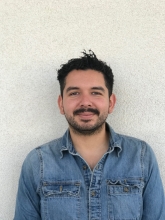 |
Major: Psychology
Home City: Merced, CA
Contact: mlaguna2@ucmerced.edu
Faculty Mentor: Jayson Beaster-Jones
|
Marco is a 4th year psychology student at UC Merced. Marco is from Merced and has been involved in the arts scene for over 10 years. His academic interests are eclectic, ranging from film theory to neurology, his current research as an undergraduate is on feedback loops and their application in the fledging field of Neurophenomenolgy, an offshoot of cognitive science and philosophy. When Marco isn't involved in research, he can usually be found hiking in Yosemite or relaxing at home in a hammock, enjoying a classic book. At UC Merced, Marco is involved in Bobcat Radio Podcast, The Fairy Shrimp Movement, in these programs he is responsible for marketing and community outreach, something he has been involved for a long time. Marco also plays in a band called Dreamweapon, they are a popular experimental band whose style in unprecedented yet effective. After Marco graduates from UC Merced, he plans on attending graduate either at UC Merced or Stanford. In graduate school, Marco plans on furthering his interest in the use of feedback loops and their practical applications to the psychological medical school. If that doesn't work out, Marco is also open to working in the private sector in marketing. If that doesn't pan out either, Marco is open to living a life of solitude somewhere in the mountains, engaged in a humble trade.
Cybernetical Systems & Neurophenomenology: Feedback Loops
Marco Laguna, and Jayson Beaster-Jones, PhD; School of Social Sciences, Humanities, and Arts, University of California, Merced
By recording the dynamics of feedback systems, a researcher can gain insight into the neurological processes involved into the discipline of human embodied cognition through creating an analogical model of the human brain by creating a modular system that utilizes the use of feedback loops. Insights derived from a feedback loop model will allow any researcher to explore areas that reach across an array of multiple disciplines such as cognitive science, psychology and physiology. This is achieved by programming an analogical model by way of modular video and audio synthesis. How this is achieved is a sine wave oscillator is routed through a video signal LFO (low frequency oscillator), into an input and output terminal source simultaneously, thus creating a positive feedback loop. Positive feedback loops, along with other types of loops, allow researchers to collect discreet data associated with the emergent properties associated with feedback systems, and their dynamics. The study of dynamical systems in feedback loops is known as Cybernetics, which has been around since the 1950’s. Along with employing techniques used in assessing subjective phenomena and coding it as an objective occurrence, we are able to create a heuristic to understanding embodied cognition through modeling a neural network using feedback loops through cybernetics and phenomenological models.
Kaline Leke
 |
Major: Biology
Home City: Oakland, CA
Contact: kleke@ucmerced.edu
Faculty Mentor: Whitney Pirtle
|
Kaline Leke is an upcoming Junior Undergraduate from Oakland, California. She is expected to graduate from the University of California, Merced spring of 2020 with a Bachelor’s of Science in Human Biology. Kaline began her mark on the campus by obtaining a leadership board position as a freshman in an organization on campus called Afrikans for Retention Outreach (AFRO) and keeping consistency to it by now being President for the upcoming school year. She then continued her mark by becoming a member of the Vice Chancellor student advisory board to discuss and find solutions to the issues and wants of students on campus. It’s very important to Kaline to advocate for others and give back the same help she received in order to aid others to succeed. In her free time, she enjoys going on adventures with friends, watching youtube videos, shopping and reading. Kaline is the future in the field of medicine as she aspires to achieve an MD degree to become an OBGYN. Her overall goal is to be a resilient positive woman role model who can enthuse young women from similar backgrounds to pursue higher education.
Living Black in the Field of Brown
Kaline Leke, and Whitney Pirtle, PhD; School of Social Sciences, Humanities, and Arts, University of California, Merced
Understanding the constant debate for resources and affinity spaces for students within college campuses requires analysis of multiple perspectives from the population themselves. This research project will explore on the retention rates and academic success of Black students at University of California, Merced (UCM). I seek to understand how involvement in black organizations and presence of black spaces help with student success academically & socially. We will study a sample of current Black college students at UC Merced, by conducting online surveys, interviews and focus groups. We will speak to key founding members and members of AFRO (Afrikans For Retention and Outreach) a black living and learning community at UC Merced. The results will give recommendations to use this research and promote institutional change in expansion of affinity spaces.
Manuel Leon
 |
Major: Sociology
Home City: Porterville, CA
Contact: mleon28@ucmerced.edu
Faculty Mentor: Whitney Pirtle
|
Manuel Leon is an incoming fourth-year undergraduate student from Porterville, California. His expected graduation date is Spring 2019 and is going to graduate with a BA in Sociology and a minor in Psychology. He hopes to contribute valuable knowledge to the field of Sociology as a member of Professor Whitney Pirtle’s research project studying the effects of cultural spaces on college campuses. He believes it is important to highlight and discuss the experiences of minorities and people of color to bring awareness to the issues that communities of color face.
Manuel Leon works for UC Merced’s Facilities Department as a Recycling/Composting intern and also participates in UC Merced’s Bobcat Leadership Series training program. In his spare time, Manuel likes to relax by going to the gym, reading news articles/editorials, playing video games, going to music festivals, and watching online videos and shows. After finishing his undergraduate career, he plans to attend graduate school to obtain a master’s degree in sociology and possibly a PhD in sociology later in life. He hopes to give back to his community of Porterville one day and work with underprivileged youth to assist them in pursuing higher education.
Living Black in a Field of Brown: A Study on Affinity Spaces
Manuel Leon, Brenna Brock, and Whitney Pirtle, PhD; School of Social Sciences, Humanities, and Arts, University of California, Merced
Historically, universities and colleges across the United States have been spaces for wealthy and white individuals to further their education and increase their economic and social capital. Because of this history, sociological research has found that college campuses can often be perceived as hostile or difficult to navigate by black and African American students. Due to the real and actual threat of racism on campuses to students of color, some students choose to involve themselves in affinity groups to successfully navigate college. Using survey methods and focus group interviews of four to eight people, my team and I seek to explore the black student experience at the University of California, Merced (UC Merced). We will interview black and African American students who have chosen to participate in a program called Afrikan’s for Retention and Outreach (AFRO) to understand the impact of AFRO and the types of students who seek these spaces. AFRO is a shared learning and living community meant to increase black and African American Student retention and graduation rates through mentoring and academic workshops. By using focus group interviews I hope to learn about how communal values shape student's self-perceptions because research has shown that having strong communal and family ties positively impacts black and African American student’s perceptions of their identities and been shown to increase self-efficacy among students of color. Our research builds upon current literature by studying the experiences of black and African American students at a Hispanic Serving Institution like UC Merced.
Ashton Melendez
Ashton Melendez is a second year undergraduate hisoty major at UC Merced. They are expected to graduate in 2021 with a BA in History. Ashton has been able to take many opportunities in undergraduate research to prepare them for their goal of going to graduate school. They also have been active within the UC Merced LGBTQ+ community as a Lambda Alliance leader. As the Financial Coordinator of Lambda Alliance (the student run LGBT+ organization at UC Merced), they’ve gained experience in working with a diverse group of people as well as budgeting and financial management. They’ve assisted in creating many events and programs to further Lambda’s goal of a more equal and accepting environment at UC Merced. On occasion, Ashton likes to travel all over California and beyond with their car and can almost always be found playing with their dog. Ashton hopes to obtain a Ph.D. in History and continue doing research and inspire others to pursue higher education.
Traditional Ashanti Art Against British Colonization
Ashton Melendez, and Muey Saeturn, PhD; School of Social Sciences, Humanities, and Arts, University of California, Merced
This research study is meant to answer: What were the impacts of British colonization on pre-colonial Ashanti art culture? After close analyzation of pre-colonial Ashanti art versus modern Ashanti art there is a notable change in their art styles (Ashanti being where Ghana is currently). The pieces being analyzed were those of historical significance to the Ashanti society: gold weights, brass cravings, ritual staffs, etc., from the Cantor Arts Center and the Museum of African Diaspora. As well as reading prominently recognized texts of history concerning the Ashanti people and their art, it becomes clearer that European contact does in fact create cultural changes that even show up in Ashanti art styles. It’s prevalent that even with religious changes, and colonization, traditional Ashanti art still survives in some areas. Although most have simply explained the art style changing due to the Christian doctrine becoming popular, or that it was due to the government dynamic changing, this change could not have happen due to a singular factor change. The combination, as well as the economic decrease with the fetishization of traditional Ashanti art versus modern West African art are all key parts of this cultural shifting. British colonization is the core reason for all of these factors, a ripple within this pre-colonial society. Ghanian artist continue to create Ashanti art as it was, showing that art culture fights against its oppressor and is able to thrive through large culture changes, due to its historical significance for the Ashanti people.
Aldo Montes Sanchez
 |
Major: Management and Business Economics
Home City: Mountain View, CA
Contact: amontessanchez@ucmerced.edu
Faculty Mentor: Nicola Lercari
|
Aldo Montes Sanchez is a third-year undergraduate student from Mountain View, CA. He is expected to graduate in Spring 2020 with a BS in Management and Business Economics. His objective is to get an MBA in business to help out people in his community facing financial struggles. Aldo is taking the initiative by getting involved in as many programs at UC Merced and is applying for internships for next year. Aldo is driving to double minor in Psychology and Public Health to be able to have more knowledge about more than one subject which would direct him to more opportunities. His main life goal is to inspire his younger brothers to continue higher education and to eventually encourage youth in his community back home, who also face similar backgrounds, to never give up on their dreams. Aldo was involved in the residence hall association, community council, campus activity board, Hermanos Unidos, and is going to be a mentor for the Bright Success Center this upcoming year. Furthermore, Aldo wants to help out the incoming freshmen by guiding them towards a successful first year. Aldo loves to play sports like soccer and basketball, but also travels in his free time. He is always a cheerful and confident individual who loves to tell jokes, but is a resilient worker when trying to achieve academic excellence.
Bringing Sustainability and Awareness Via a Mobile App
Aldo Montes Sanchez, and Nicola Lercari, PhD; School of Social Sciences, Humanities, and Arts, University of California, Merced
The John Muir Geotourism App is a digital humanities project that contributes to the discourse on California environmental and local history, such as creation, interpretation, and preservation of human culture. This research approaches the study of John Muir legacy through the lens of Geo-tourism, which as a new type of tourism related to different features on geological and natural sites based on the environment which leads to geo-heritage conservation that goes through a variety of sustainability measures to promote an understanding through education. The primary research method used in this project revolves around analyzing articles regarding geo-tourism or geoparks. The second method was on doing content analysis on a variety of John Muir Apps to be able to enhance the app we are constructing. Furthermore, this work conducts a literature review because most of the results to demonstrate that geo-tourism is bringing more sustainability in the areas where there are geoparks is proved through scholarly articles. My preliminary results show that through geo-tourism local communities become more aware of the history of the San Joaquin Valley and Sierra Nevada Foothills leading to increasing awareness on the significance of historic and environmental preservation in these regions. Overall, this work has explored the role of digital humanities in fostering social and economic justice in the local regions and identified the importance of educating local communities.
Rochelle Mulondo
Rochelle Mulondo is a fourth-year undergraduate at the University of California, Merced who is pursuing a degree in Public Health with a minor in Business, Management and Economics; she is expected to graduate in the Spring of 2019. Rochelle is passionate about social change and civil rights and wants to pursue a career in law and policy to advocate for minority women's health rights. Outside of the classroom, she has been involved in the Yosemite Leadership Program, served as President of Afrikans for Retention and Outreach (AFRO Hall), and worked as the CalFresh Outreach Intern for the Health Promotion and Basic Needs Security offices. In her free time Rochelle enjoys traveling, African dance and spending time with family and friends. This Fall she will spend the semester studying at the UC Washington D.C. center and hopefully interning on Capitol Hill to lay the foundation for her to pursue a career in Law and Policy, and Ultimately a JD.
Living Black in a Field of Brown
Rochelle Mulondo, and Whitney Pirtle, PhD; School of Social Sciences, Humanities, and Arts, University of California, Merced
Extant research has shown that Black students represent a vulnerable population of students that experience unique struggles which can result in low graduation and retention rates at institutions of higher education compared to other racial groups. Our research team wants to investigate the intricacies of Black student success on the uniquely diverse University of California of Merced (UCM) campus, a Hispanic Serving Institution (HSI), and discover how Black cultural spaces and affinity groups work to aid Black student’s success in this context. Black students at UC Merced are graduating at higher rates than Black students at other public universities, and we want to know if this can be attributed to Black affinity spaces. We will conduct a qualitative study that will consist of interviews with key actors in the establishment of AFRO Hall, a Black living and learning community at UCM that was founded in 2014. We will hold two focus groups with Black students (n=18) who belong to this space and students who do not. The results will show how Black cultural spaces effect Black students’ academic success at an HSI. This study will reveal whether having Black cultural spaces as a resource in these institutions has a positive impact on Black students’ success.
Sandy Rodriguez
Sandy Rodriguez is a rising fourth-year undergraduate student at the University of California, Merced. She is expected to graduate in the Spring of 2019 with a Bachelor of Arts degree in Sociology. Sandy is interested in issues concerning incarceration, race, and inequality. After she completes her undergraduate studies, Sandy hopes to attend graduate school and obtain a Ph.D. She aims to be a voice for those who are oppressed and underrepresented. On campus, Sandy has been involved in several organizations including: Hermanas Unidas, the Bobcat Leadership Program, the Sociology Club, and Lambda Theta Nu Sorority Inc. During her free time, she enjoys being with family, exploring new places, and watching movies.
Understanding the 2016 Prison Strike
Sandy Rodriguez, and Zulema Valdez, PhD; School of Social Sciences, Humanities, and Arts, University of California, Merced
Historically, the factors that lead to prison strikes in the United States include overcrowding and abuse. However, many Americans are unaware of this history, due to the lack of media attention and the barrier of communication between incarcerated people and the larger society outside. The largest prison strike in history occurred on September 9, 2016, which was the 45th anniversary of the Attica Rebellion. I examined the factors that led to the strike by reading 8 articles, 10 newspaper stories, (Los Angeles Times, CNN) and observing a number of interviews with incarcerated people. Incarcerated people stated they participated in prison strikes as a result of unfair wages, basic amenities and putting an end to solitary confinement. However, many prison staff from a variety of states, denied there being any strikes at all. I found that incarcerated people participated in prison strikes in 2016 ultimately, as a result of putting an end to slavery behind bars. Nevertheless, prison strikes will continue to occur as long as the conditions behind bars continues to stay the same.
Karina Santiago
 |
Major: Management and Business Economics
Home City: Paso Robles, CA
Contact: ksantiago3@ucmerced.edu
Faculty Mentor: Jayson Beaster-Jones
|
Karina Santiago is a fourth-year undergraduate student from Paso Robles, CA located in the San Luis Obispo county. She is expected to graduate from UC Merced in Spring 2019 with a BS in Management and Business Economics and a minor in Cognitive Science. Karina is a first-generation college student who is involved in Business Society and is a former Resident Assistant. Karina enjoys learning a little bit of everything from science to humanities, and in her free time she enjoys spending time outdoors hiking or taking spontaneous trips with family or friends. Upon receiving a BS, Karina plans to attain a Masters of Science in Business Analytics and work for a tech company, while her ultimate goal is to attain a Ph.D. and become a professor that researches about poverty in the United States and Mexico.
Content and Comparative Analysis of Controversial Commercials: Message Sensation Value and Relationship with Viewer's Responses
Karina Santiago, and Jayson Beaster-Jones, PhD; School of Social Sciences, Humanities, and Arts, University of California, Merced
Some commercials are formed based on political climates ongoing at the time, as it gathers more attention from viewers. These commercials tend to elicit different viewer responses as viewers gather contradicting messages based on their beliefs. This research uses a comparative and content analysis of two controversial commercials based on German and Mexican immigration from the most watched event in the United States, the Super Bowl. By gathering viewer's YouTube responses shared, background qualities of the commercials and comparing and contrasting the different scenarios and responses from the two commercials, it was gathered that the commercials used many similar characteristics in terms of video, music, and message creation, but used white male versus brown family to articulate their messages to their audience. In the YouTube commentary analysis, it was found that many viewers today have a less aggressive attitude towards European immigration than Latino immigration. The effectiveness of embedding political messages into commercials is seen in these two commercials where it had high commercial views and high viewer responses making it an effective commercial.
Brandon Sor
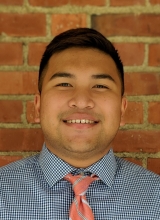 |
Major: History
Home City: Stockton, CA
Contact: bsor@ucmerced.edu
Faculty Mentor: Ma Vang
|
Brandon Sor is a fourth-year undergraduate student from Stockton, CA. Brandon will be graduating in the Spring of 2019 with a BA in History. Given the opportunity, Brandon wanted to make a better impact on his community by conducting research. More specifically, his research focuses on the obstacles of being a refugee and how it affects a refugee’s academic integrity. With this research, he hopes to uncover the difficulties a refugee or underprivileged person would have when seeking a higher education and how they can overcome these difficulties. When he's not conducting research, Brandon likes to relieve stress by spending time with family and friends, fishing, and traveling. He aspires to achieve a PhD in Critical Race and Ethnic Studies, and his ultimate goal is to inspire youth from similar backgrounds to seek a higher education.
Cambodian Refugees Navigating Through a Foreign Education System
Brandon Sor, and Ma Vang, PhD; School of Social Sciences, Humanities, and Arts, University of California, Merced
This study discusses the effects of the American Education System on Cambodian Refugees who have escaped the Khmer Rouge. By analyzing the history of the Refugees, one can clarify that the past trauma from the Khmer Rouge and being new to a foreign country puts Cambodian Refugees at an educational disadvantage. This creates a more challenging situation for Cambodian refugees who are trying to navigate the American Education system to achieve a higher education. This study extensively uses information from books and articles that have been written on the experiences of Cambodian Refugees coming to America and books on experiences of Cambodian Refugees surviving the Khmer Rouge. This study is also supported by secondary interviews of Cambodian refugees speaking about their experiences during the Genocide and their new lives in America. The study leads to a conclusion that the violence and shock from surviving the Genocide is carried over when the refugees make a new home in America. This past trauma affects the ability of Cambodian Refugees to adjust to their new lives in America. Despite the hardships, many Cambodian refugees try to adjust to their new lives in America and seek a higher education. Although it may be challenging, the refugees continue to fight their way and navigate the American Education system.
Jovo Velasco
Jovo Angel Velasco is a fourth-year undergraduate student from Stockton, CA. Expected to graduate in spring 2019 with a BA in Public Health. Jovo has begun to leave a legacy at the University of California, Merced and the Merced Community. As a Resident Assistant for Housing and Residence Life, Jovo has impacted the lives of many residents by providing resources to achieve academically and socially. Jovo is also a Peer Educator for Planned Parenthood Mar Monte, volunteering his time teaching college students and the Merced Community about sexual and reproductive health. Jovo's passion for health policy has led him to being a research assistant in a Health Policy Lab at UC Merced, identifying the impacts of medical aid in the Honduras healthcare system. On his free time, Jovo finds himself at a new restaurant and enjoys spending time with his family and friends. Jovoplans to achieve a Master's in Public Health in Health Policy and Management and aspires to be a Public Health Director.
Perceptions of Senior Services in Merced County: A Qualitative Study
Jovo Velasco, and Denise Payan, PhD; School of Social Sciences, Humanities, and Arts, University of California, Merced
Studies on experiences and perceptions of senior services such as community centers, nursing homes, and assisted living communities tend to be scarce, particularly in rural areas. Seniors are considered vulnerable and are usually diagnosed with at least one or more health complications. Seniors are often less independent and require additional support. There are great alternatives such as nursing homes and assisted living communities, tending to be very expensive. An alternative service for seniors is community centers, but these facilities lack other services that seniors need. Studies have identified several barriers seniors face when receiving or seeking social services and healthcare. This study seeks to fill a gap in the literature of the barriers seniors face, particularly in Merced County, a rural area. Using qualitative interviews, the study examines seniors’ attitudes towards nursing homes and assisted living communities. Preliminary findings reveal that there are barriers seniors face when seeking and receiving social services and health care such as affordability, accessibility, comfort, knowledge of where to go, language, and lack of quality of care. In addition, perceptions of nursing homes and assisted living communities vary among seniors depending on knowledge, and family or personal experience. With people living longer and the senior population continuously growing, it is important to understand the struggles seniors face when receiving and seeking adequate services and healthcare they need.
Melvis Villeda
 |
Major: Sociology
Home City: Los Angeles, CA
Contact: mvilleda@ucmerced.edu
Faculty Mentor: Nicola Lercari
|
Melvis Villeda is a third-year who is majoring in Sociology and will graduate in Spring 2020. Melvis’s short term goal is to declare Business Management Economics as his minor this year. Another goal of his is to continue doing research for this year and to find an internship for next summer. In addition, he plans to continue to go to school until he achieves his PhD. His long-term goal is to enjoy life by spending his time with family and friends and at the same time, find a career that involves being a leader that would impact others. Melvis’s main accomplishment, other than being a UROC scholar, would be that he was part of dance coalition that helped him speak in front of a public audience. He was also involved with Resident Hall Association and Community Council, which motivated Melvis to take the position as a Vice President of Operations. This helped him learn to be a leader and work as a team with RHA members to create events. Melvis aspires to help others and inspire them to pursue their passions through higher education.
Communication of Hetch Hetchy Debate Via Mobile App.
Melvis Villeda, and Nicola Lercari, PhD; School of Social Sciences, Humanities, and Arts, University of California, Merced
Communication of Hetch Hetchy Debate through Via mobile app In the mid-eighties, San Francisco experienced the longest drought ever recorded in history. This lead to the process of passing the bill to construct the Hetch Hetchy dam. At the same time, conservationists supported the construction of the dam and preservationists, such as John Muir, fought against preserving Hetch Hetchy wildlife. In 1913, the conservationists won, while the Hetchy Hetchy dam was approved and in 1923 the Dam was Built. Today the Hetch Hetchy reservoir supplies water to the people of San Francisco. This study was drive by the following research question: By what means can geo-tourism mobile apps be suitable to people when discussing the environmental debate of Hetch Hetchy (1908-1913) that brought nation-wide awareness to conserve Yosemite and other national parks? The methods used in this study were to gather data and create a literature review by comparing the impacts of other geo-tourism apps. Another method used was trying to understand using "Map2App" to communicate via mobile apps on the important role debate on Hetch Hetchy environmental debate that helped preserved National Parks. The studies show that geo-tourism apps are viable tools to communicate the history Hetch Hetchy because it allows seeking information about the environment by creating a connection with nature. Lastly adding Hetch Hetchy in Map2App would be a good way to communicate about its history that leads to preserving Yosemite, Sequoia, and the Grand Canyon.
Ya Yang
 |
Major: Public Health and Psychology
Home City: Oroville, CA
Contact: yyang67@ucmerced.edu
Faculty Mentor: Linda-Ann Rebhun
|
Ya Yang is a third-year undergraduate student at the University of California, Merced. He will be graduating Spring of 2019 with a Bachelor's of Arts in Psychology and Public Health. Mr. Yang has been involved and held leadership positions in organizations such as Generation to Generation, Best Buddies, CARE, and Rotaract. He also interns in the Office of Chancellor. Yang was a research assistant in Health and Communication Interventions as well as the Health and Equity Lab. To destress, Yang finds himself playing badminton and sleeping. A lifetime accomplishment of Yang is being the Undergraduate Representative for the Spendlove Prize Committee at the University of California, Merced. After completing his degrees in the Spring of 2019, Mr. Yang plans to go to graduate school and obtain his PhD in Public Health.
The Complex Issues of Hmong Shamans
Ya Yang, Nancy Burke, PhD, and Linda-Ann Rebhun, PhD; School of Social Sciences, Humanities, and Arts, University of California, Merced
The Hmong are an ethnic group from Southeast Asia who have lived as forced political refugees for the past several hundred years. In the Hmong culture, healing is, and always has been, the main work of the shaman (Pinzon-Perez, 2005). Hmong shamans do not treat physical illness as practiced by western medicine, rather they center their practice around spiritual maladies (Fontaine, 2000). The shamanic practice cannot be learned; shamans are spiritually chosen by their ancestors. Although Hmong shamans are well-respected within the community as healers, the health issues that they have to experience and the changes in their lives are not addressed. Semi-structured in-depth interviews were conducted with 9 Hmong shamans from the Central Valley, Minnesota, and Thailand. Findings revealed that (1) they experienced at least an illness, physically or mentally, before they became a shaman (2) after one becomes shaman, they must cleanse their physical bodies by consuming products that are pure both in preparation and content (3) the healing process exposes shamans to spiritual risks that can potentially end their lives (4) most of their relationships with family and community members become better.



